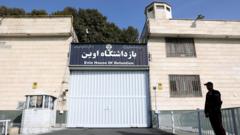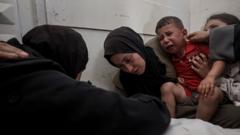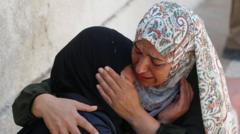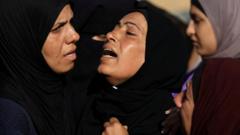Israeli forces' recent closure of three UN schools in East Jerusalem has resulted in hundreds of Palestinian students being sent home. The United Nations Relief and Works Agency (UNRWA) condemned the action as a violation of international law and criticized Israel for disrupting access to education for Palestinian children.
Israeli Forces Shut Down UN Schools in East Jerusalem Amid Protests

Israeli Forces Shut Down UN Schools in East Jerusalem Amid Protests
Armed Israeli security forces have ordered the closure of UN-run schools in Shuafat refugee camp, sparking outrage over children's right to education.
The situation unfolded early Thursday morning, just after classes began. Armed Israeli security forces surrounded the schools, leading to the immediate dismissal of over 550 students aged six to fifteen. Philippe Lazzarini, UNRWA's Commissioner-General, pointed to this action as a significant infringement of educational rights and a distressing experience for the children involved. Video footage showed students in uniforms embracing outside the school as the closure ensued.
The backdrop to this incident includes a ban on UNRWA that was established earlier this year, with Israeli officials accusing the organization of ties to Hamas, a claim that UNRWA vigorously denies. The Israeli authorities fixated on the closure orders issued last month were characterized by Lazzarini as a blatant violation of UN statutes concerning the safety and immunity of educational institutions. He stressed the critical role that these schools play in ensuring continued education for Palestinian youth.
In a wider context, the Palestinian Authority condemned the closures, viewing them as a fundamental violation of children's educational rights. Additionally, the British consulate in Jerusalem articulated concerns shared by several countries, including the UK and EU, emphasizing the need for adherence to international obligations for educational institutions.
This agency has had a continuous operational mandate in East Jerusalem since 1950. However, recent Israeli legislation has banned any contacts between Israeli officials and UNRWA, further complicating the agency's efforts to aid Palestinian communities.
Historically, Israel captured East Jerusalem during the 1967 Middle East war, subsequently annexing the territory in 1980—a move that remains largely unacknowledged by the global community. Assessing the demographic contrast, approximately 230,000 Israeli settlers reside in East Jerusalem alongside an estimated 390,000 Palestinians, a situation that fuels ongoing disputes over legal and territorial rights.
Both regional and international opinions continue to diverge on the legitimacy of the settlements and actions like the school closures, reflecting the complex dynamics of the Israeli-Palestinian conflict.
The backdrop to this incident includes a ban on UNRWA that was established earlier this year, with Israeli officials accusing the organization of ties to Hamas, a claim that UNRWA vigorously denies. The Israeli authorities fixated on the closure orders issued last month were characterized by Lazzarini as a blatant violation of UN statutes concerning the safety and immunity of educational institutions. He stressed the critical role that these schools play in ensuring continued education for Palestinian youth.
In a wider context, the Palestinian Authority condemned the closures, viewing them as a fundamental violation of children's educational rights. Additionally, the British consulate in Jerusalem articulated concerns shared by several countries, including the UK and EU, emphasizing the need for adherence to international obligations for educational institutions.
This agency has had a continuous operational mandate in East Jerusalem since 1950. However, recent Israeli legislation has banned any contacts between Israeli officials and UNRWA, further complicating the agency's efforts to aid Palestinian communities.
Historically, Israel captured East Jerusalem during the 1967 Middle East war, subsequently annexing the territory in 1980—a move that remains largely unacknowledged by the global community. Assessing the demographic contrast, approximately 230,000 Israeli settlers reside in East Jerusalem alongside an estimated 390,000 Palestinians, a situation that fuels ongoing disputes over legal and territorial rights.
Both regional and international opinions continue to diverge on the legitimacy of the settlements and actions like the school closures, reflecting the complex dynamics of the Israeli-Palestinian conflict.





















